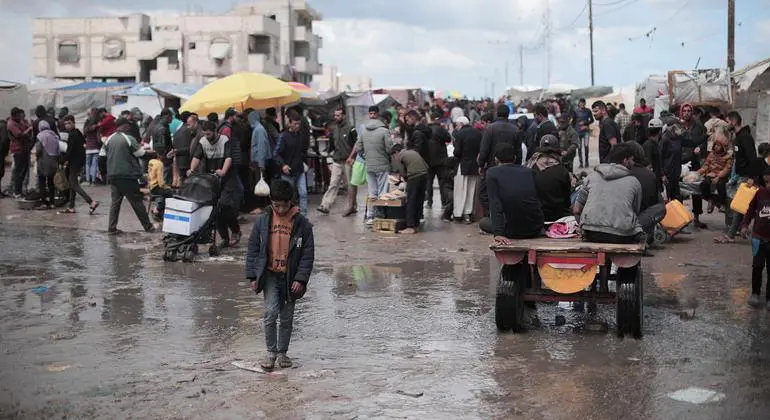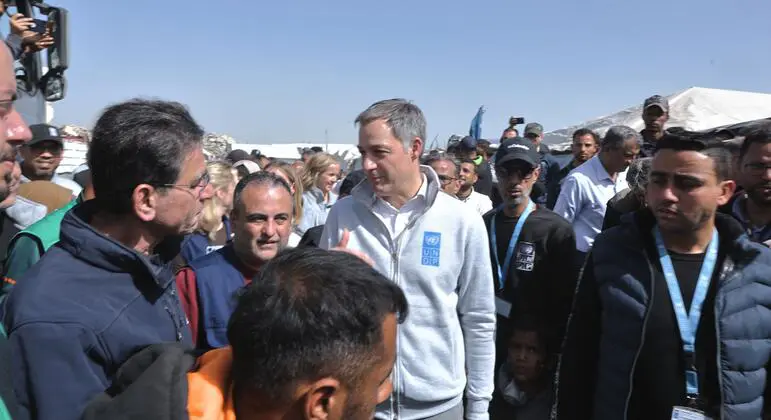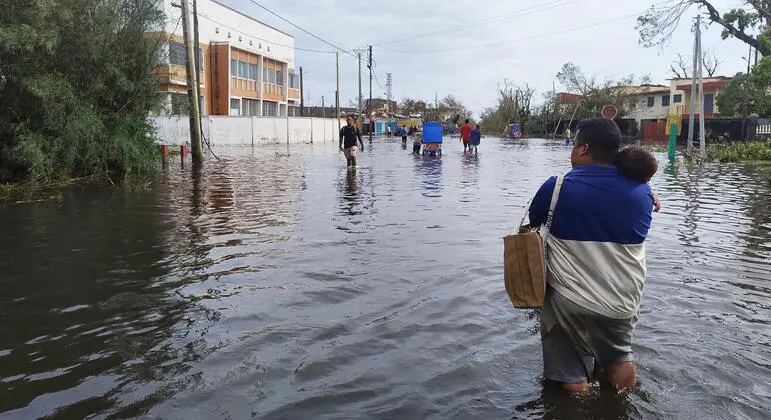Multiple news outlets have reported that Hamas’s supreme leader, Ismail Haniyeh, had confirmed the militant group’s acceptance of what it stated were Israel’s ceasefire terms in a phone call with Qatar’s Prime Minister and a senior Egyptian minister. The two countries have been leading negotiations between the warring parties.
However, the Israeli leadership has reportedly indicated that the deal indicated by Hamas falls far short of its demands to end the fighting. Israel said it would send a delegation to continue ceasefire talks and also continue its Rafah operation in the meantime.
‘Make an agreement’: Guterres
UN Secretary-General António Guterres reiterated his pressing call to both sides “to go the extra mile needed to make an agreement come true and stop the present suffering”, his Spokesperson said in a statement.
The Secretary-General also voiced deep concern over indications that a large-scale military operation in Rafah may be imminent.
“We are already seeing movements of people – many of these are in desperate humanitarian condition and have been repeatedly displaced,” the statement continued.
The Secretary-General also reminded the parties that the protection of civilians is paramount in international humanitarian law.
Opportunity ‘cannot be missed’
Speaking later in the evening New York time, Mr. Guterres told reporters at a press encounter alongside the President of Italy that he had made “a very strong appeal to the Government of Israel and to the leadership of the Hamas in order to go an extra mile to materialise an agreement that is absolutely vital”.
“This is an opportunity that cannot be missed”, the UN chief stressed.
“A ground invasion in Rafah would be intolerable because of its devastating humanitarian consequences and because of its destabilising impact in the region.”
No UNRWA evacuation
Earlier in the morning following news of the Israeli evacuation order, the UN agency for Palestine refugees UNRWA said in a post on X that “an Israeli offensive in Rafah would mean more civilian suffering and deaths. The consequences would be devastating for 1.4 million people”.
“UNRWA is not evacuating: the agency will maintain a presence in Rafah as long as possible and will continue providing lifesaving aid to people.”
Children on ‘edge of survival’
Echoing that alert, the UN Children’s Fund (UNICEF) warned that “a military besiegement and ground incursion in Rafah would pose catastrophic risks to the 600,000 children” sheltering there.
Many “are highly vulnerable and at the edge of survival”, the UN agency said in a statement, highlighting increased violence in Rafah and the fact that potential evacuation corridors were “likely mined or littered with unexploded ordnance”.
Any military move on Rafah will likely result in very high civilian casualties while also destroying “the few remaining basic services and infrastructure” that people need to survive, UNICEF insisted.
“Hundreds of thousands of children who are now cramped into Rafah are injured, sick, malnourished, traumatised or living with disabilities,” said UNICEF Executive Director Catherine Russell. “Many have been displaced multiple times and have lost homes, parents and loved ones. They need to be protected along with the remaining services that they rely on, including medical facilities and shelter.”
Listen below to our in-depth interview with UNRWA’s Louise Wateridge as fear builds of a fullblown invasion of Rafah:
Full-blown famine call
In a related development, the head of the UN World Food Programme (WFP) said that northern Gaza is now experiencing “full-blown famine…and it’s moving its way south”.
Cindy McCain’s remarks on Sunday echoed serious and repeated concerns from other senior UN officials and the international community about aid restrictions and delays imposed by Israeli authorities.
“The Israeli authorities continue to deny humanitarian access to the United Nations,” insisted UNRWA chief Philippe Lazzarini. “Only in the past two weeks, we have recorded 10 incidents involving shooting at convoys, arrests of UN staff including bullying, stripping them naked, threats with arms and long delays at checkpoints forcing convoys to move during the dark or abort,” he said in a post on X on Sunday.
The UNRWA Commissioner-General also condemned rocket attacks on the Kerem Shalom crossing into Gaza which reportedly killed three Israeli soldiers, leading to its closure. The crossing is a key humanitarian relief entry point.
‘Al Mawasi is not safe’
According to media reports, leaflet drops by the Israeli military above eastern Rafah advised communities to move to the so-called safe zone of Al Mawasi, to the west of Rafah, by the Mediterranean Sea.
UN humanitarians have previously rejected similar evacuation initiatives by the Israeli military on the grounds that they represent forced displacement.
“In Al Mawasi, there is a severe lack of sufficient infrastructure, including water available, and it is not feasible to support tens of thousands of displaced people there,” UNRWA spokesperson in Gaza Louise Wateridge told UN News.
More than 400,000 people already shelter in the coastal location, according to the UN agency’s latest assessment, which reported an influx of displaced persons from the nearby city of Khan Younis. To help them, UNRWA has two temporary health centres in Al Mawasi, along with other newly established medical points in the area.
“Unlike claims [to the contrary], it is far from safe because nowhere is safe in Gaza,” insisted UNRWA Communications Director Juliette Touma.
Since 7 October, when Hamas-led terror attacks on southern Israel prompted massive Israeli bombardment and a ground offensive, at least 34,680 Palestinians have been killed, including over 14,000 children, and over 78,000 wounded, according to the Gazan health authorities. Some 1,250 people were killed in southern Israeli communities and more than 250 were taken hostage.
‘Inhumane’ order to evacuate: Rights chief
UN High Commissioner for Human Rights Volker Türk on Monday warned that civilian deaths, suffering and destruction were set to increase beyond already unbearable levels following the eastern Rafah evacuation order.
“This is inhumane. It runs contrary to the basic principles of international humanitarian and human rights laws, which have the effective protection of civilians as their overriding concern.
“Forcibly relocating hundreds of thousands from Rafah to areas which have already been flattened and where there is little shelter and virtually no access to humanitarian assistance necessary for their survival is inconceivable. It will only expose them to more danger and misery.”
“More attacks on what is now the primary humanitarian hub in the Gaza Strip are not the answer,” Mr. Türk added.







